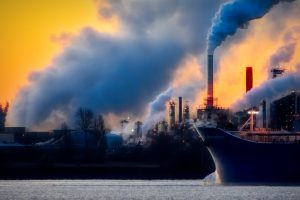
Air pollution from industrial plants Source
According to new research from the Sea Around Us project at the University of British Columbia, carbon dioxide emissions released by fuel-burning fishing vessels have quadrupled since 1950.
Krista Greer and her team found out 207-million tonnes of CO2 were released into the atmosphere by marine fishing vessels in 2016 alone which is about 30 percent higher than what was previously reported which may reasonably be anticipated both to endanger public health and to endanger public welfare.
Why were the reports different from before?
The previous study implied that fisheries contributed only 0.29 percent of global CO2 emissions, while this new study indicates that their contribution is almost twice that number. The reason behind this difference in the reports is that the new research by Krista Greer and her team has considered the regional differences in fuel use based on fishing effort and the amount of fuel used to catch 30 million tonnes of fish that were not reported in 2016.
In an interview with Krista Greer, she further explained how greenhouse gas emissions from fisheries continue to rise and why the focus of their study was fisheries and CO2 gas in particular.
But how can we reduce the CO2 emissions and maintain the catch totals?
There are a number of ways to maintain our catch total while reducing the CO2 emissions such as educating the captains or reducing the number of bad weather days to go fishing! After listening to the podcast below you will better understand how these ways could be really effective in reducing the CO2 emissions by marine fisheries!
So far we were worried about how environmental changes impact the fish populations and fisheries, but now we know that fisheries themselves have negative effects on the environment. However, we can hopefully reduce these negative impacts with Krista’s suggestions.
